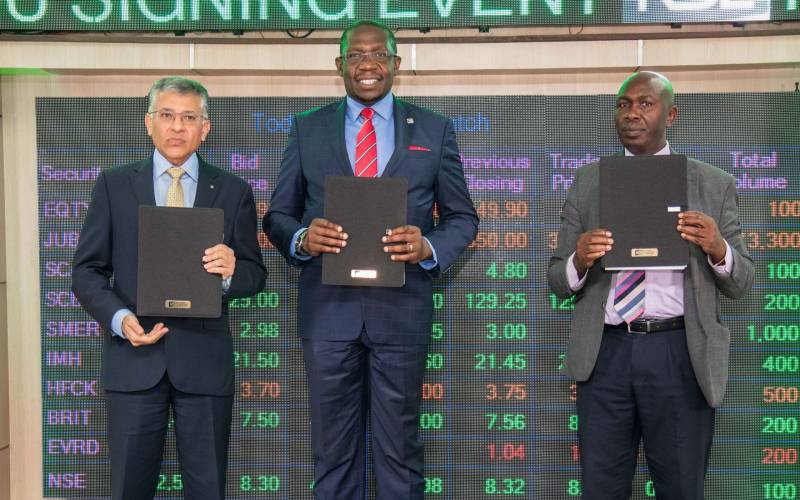Sundeep Raichura, Chairman, Kenya Pension Funds Investment Consortium (KEPFIC), Geoffrey Odundo, Chief Executive, Nairobi Securities Exchange (NSE) and Mr. Wycliffe Shamiah, Chief Executive Officer, Capital Market Authority (CMA). [Courtesy] The Kenya Pension Funds Investment Consortium (KEPFIC) seeks to deploy over Sh250 billion in the next five years to fund infrastructure development in the country.
KEPFIC has partnered with the Nairobi Securities Exchange (NSE) and the Capital Markets Authority (CMA) to mobile the funds.
KEPFIC Chairman Sundeep Raichura said the three entities would use available capital markets products such as green bonds, asset-backed securities and Real Estate Investment Trusts (REITs).
"This partnership will enhance the transparency and liquidity of our members’ investments as well as pave the way for collaborative stakeholder engagements and capacity building initiatives pertaining to alternative assets in the capital markets,” said Mr Raichura (pictured) at a press briefing on Wednesday in Nairobi. READ MORE
NSE Chief Executive Geoffrey Odundo said the partnership would deepen the growth of the capital markets.
"The MoU will not only leverage economies of scale but also help in financing big-ticket infrastructural projects and provide an avenue for enhancing the liquidity of investments through the capital markets,’ said Mr Odundo. CMA Chief Executive Wyckliffe Shamiah challenged the industry to take advantage of the new pension fund investment regulations to fund the country’s growing infrastructure needs.
This follows the recent amendments in pension fund investment regulations by the Retirement Benefits Authority (RBA), allowing pension funds to directly invest up to 10 per cent of their portfolio in the asset class, unlocking Sh140 billion for infrastructure investments. “Kenya’s infrastructure financing requires a bit of support because according to the World Bank, we do have a deficit which stands at around $2.1 billion or Sh231 billion annually,” noted Mr Shamiah.
